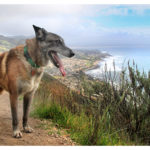Meet Dana, our Pismo Beach Vet “Pet of the Week.”
Dana came in to see us on emergency for sudden and persistent bleeding from her mouth and around her left eye. She was almost unable to stand due to weakness and was laboring to breath. We admitted her immediately and started treatment for her shock. Her belly also seemed slightly distended so we performed a brief ultrasound and found a large amount of fluid, which we suspected was blood.
Given her symptoms, we questioned Dana’s owner about any possibility of exposure to rat or squirrel bait. The owner indicated that Dana lived on property and that squirrel bait had been used in enclosed traps in the past.
Blood work indicated that Dana was very anemic (low blood count) and when we tested her ability to clot, her values were very abnormal. Dana was beginning to bleed into her lungs and belly as a result of exposure to the bait, and she would be unlikely to survive without aggressive care.
Most Rat and squirrel baits work by tying up all the Vitamin K in the body, which is necessary to form blood clots. Though we don’t think about it, we are constantly getting tiny bruises and dings in our everyday activities that cause micro bleeding. In a healthy person or animal, the body quickly forms clots to stop the bleeding. In an animal that has ingested rat bait, the bleeding cannot stop and untreated animals eventually die from internal bleeding.
Dana’s owner was savvy enough to bring her in quickly, and as a result, saved her life. We gave her Vitamin K supplements (the antidote for rat bait) and she had several blood transfusions over two days. Within 24 hours she was walking normally again, eating, and acting like her normal self! She will continue to take Vitamin K for at least 3 weeks to make sure that the toxin is fully out of her system.
Rat, gopher, and squirrel baits are extremely toxic to pets and we strongly recommend against their use in any situation where other animals (or people) may be present. In virtually every situation we see, the bait has been stored in an “inaccessible” location or enclosed trap that was labeled as “safe for use around pets.” The reality is that it smells and tastes so good that pets seek it out and get into it anyway. Additionally, the poison will pass unchanged through the system of the rat or squirrel; so if the dog eats the rat, it’s the same as eating the bait directly. And we know that rats can basically go wherever they want! It’s best to use live traps or contact a professional if pests are a problem.
Be aware that symptoms of bleeding do not arise until several days after ingestion. In addition, there are other types of rodenticides that have more immediate and different toxic effects. Therefore, if you see or suspect your pet has eaten a rodenticide, seek veterinary attention immediately.




